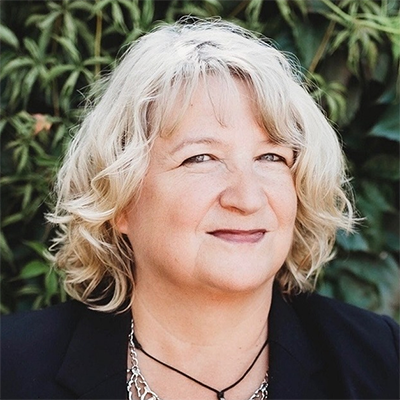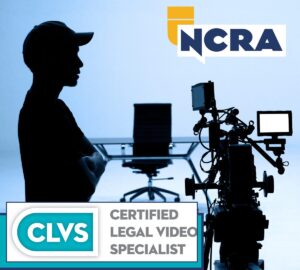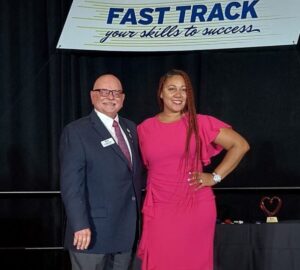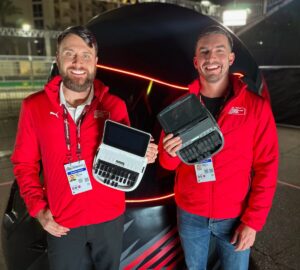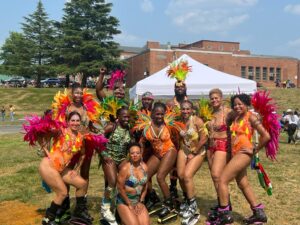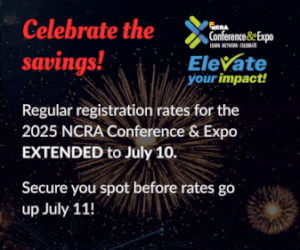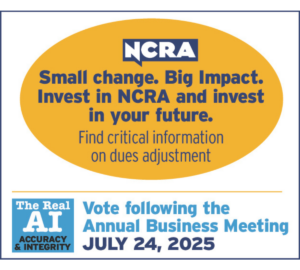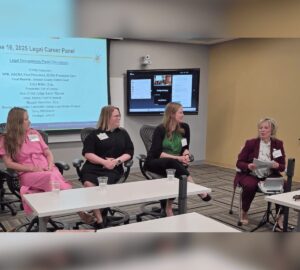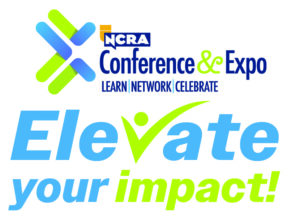Phyllis Craver Lykken, FAPR, RPR, has come a long way since she took a Gregg shorthand class in college over 40 years ago. Today she is a freelance court reporter and agency owner of Central Court Reporting & Video in Yakima, Wash. She has also served as president of the Washington Court Reporters Association (WCRA) on three separate occasions and currently serves on the Board of Directors of NCRA.
Craver Lykken’s long involvement with WCRA, and a presentation to the Washington State Bar Association (WSBA) to educate attorneys about compliance issues in 2018 led her to a review of rules related to taking depositions. “I noticed there was no direct language that would allow for remote oath administration in situations where the court reporter was not with the witness,” she says. WCRA drafted language for a new Supreme Court rule, and by the time COVID-19 hit in March of 2020, the state’s Supreme Court already had what it needed to put through an emergency order for a rule change.
This fall, thanks to her years of dedicated service and her work with the WSBA and the Supreme Court, Craver Lykken was nominated to serve on both the Character and Fitness Board and the Limited License Legal Technician Board of the WSBA.
“I believe being involved and passionate about the legal justice system and the roles court reporters play within it is what brought this all about,” said Craver Lykken of the appointments. “I would encourage everyone to volunteer for your professional associations so you can help make a difference! It’s rewarding, you establish life-long friendships, and your finger is always on the pulse of your chosen career path’s health.”
The JCR reached out to ask what this honor means to Craver Lykken and about her long career in the profession.
JCR | Congratulations on these two appointments. How did you feel when you received the news?
PCL | I felt honored to be considered for and appointed by the Supreme Court for these positions. I’m looking forward to serving in these roles and gaining a new perspective on various facets of the practice of law in Washington.
JCR | Can you explain what these two Boards do and what serving on them means to you?
PCL | A limited license legal technician (LLLT) is licensed by the Washington Supreme Court to advise and assist people going through divorce, child custody, and other family law matters in Washington. They consult with and advise clients, complete and file necessary court documents, and assist pro se clients at certain types of hearings and settlement conferences. They also help with court scheduling and support clients in navigating the legal system. LLLTs are well trained, experienced, and competent licensed legal professionals. If you cannot afford a lawyer, a legal technician might be an affordable option for your family law matter. The LLLT Board is responsible for developing and recommending to the Washington Supreme Court general policy for the LLLT license. I had the opportunity to recommend an LLLT for a young nephew and was incredibly impressed with how effective they were in helping him navigate a child custody issue. I think other states are also undertaking this licensure.
The Character and Fitness Board conducts hearings to determine whether applicants for admission to the practice of law can establish that they have the good moral character and fitness required to engage in the practice of law. The Board plays a significant public protection role by helping the Washington Supreme Court reach an opinion about whether applicants will be able to maintain those standards. In doing this, the Board conducts a very personalized hearing for each applicant and can be presented with evidence of significant prior or current misconduct and/or inspiring stories of rehabilitation. After reading the hearing materials and considering the testimony, the Board prepares written findings and a recommendation, which are submitted to the Washington Supreme Court for final decision and action.
JCR | You had a hand in getting the Supreme Court of Washington to issue an emergency order during COVID-19 to authorize remote oath administration. But this was in the works even before March 2020. Can you explain why this was important to you?
PCL | I believed a hole existed in court rules that needed to be filled to formally allow for certified court reporters to administer oaths remotely. It’s something I pursued with our board of directors, our legal counsel, and then ultimately our board of directors voted to file for a general rule amendment to add the language to our court rules. No sooner had the GR been submitted and accepted for review by our Supreme Court than COVID broke out and nearly shut down legal proceedings across the state and around the country. I knew our proposed rule amendment had been published for comment, so I contacted WSBA’s president at the time and asked for his assistance in getting an emergency order entered by our Supreme Court. Within approximately two hours, the WSBA Board of Governors had a letter emailed over to the Supreme Court and they immediately issued an order. Within the order they credited the WCRA for the quick action in bringing the order forward.
JCR | How did you first learn about the career of court reporting?
PCL | I was studying Gregg shorthand in college, thinking about a career as a legal secretary. While in college, I obtained a job as a secretary for Clallam County and was asked to sit in and take meeting minutes for the Board of County Commissioners … in Gregg. I wondered if there might be an easier way to capture the minutes, and the instructor for the Gregg shorthand class suggested I explore the court reporting profession. I enrolled the following year and fell in love with court reporting.
JCR | You have had a long record of service in your career. What motivates you to continue to serve?
PCL | I learn something new every day. I feel motivated each new day to give the world the best I’ve got and hope to encourage and convince others to participate in the advancement of court reporting as the best method of capturing the spoken word.
JCR | What does NCRA membership mean to you?
PCL | Belonging to NCRA brings continued growth, development, and seemingly endless vibrant connections to others within the field. I love being involved with others who are passionate about their profession and strive to keep themselves fresh and informed about technology. Together we are stronger. United we stand. I’m all for supporting state and national associations. They are our LIFEBLOOD!
JCR | Why do you feel credentials are important?
PCL | Someone who undertakes credentialing shows their employers, their clients, their colleagues, literally everyone they come into professional contact with that they have the knowledge, the desire, and the skills to perform their professional service. It denotes to all that they reach higher.
JCR | Where do you see the future of the court reporting and captioning professions?
PCL | I believe both will stay in strong demand through my lifetime and beyond.
JCR | What advice would you give to someone who is thinking about entering this career?
PCL | Explore the best options available, stick with your program of choice, and practice four hours a day like it’s your job! I did, and 42 years ago I was able to do it in 14 months. You will love it!
Phyllis Craver Lykken, FAPR, RPR, is a freelance court reporter and agency owner in Yakima, Wash. She can be reached at phyllis@centralcourtreporting.com.
